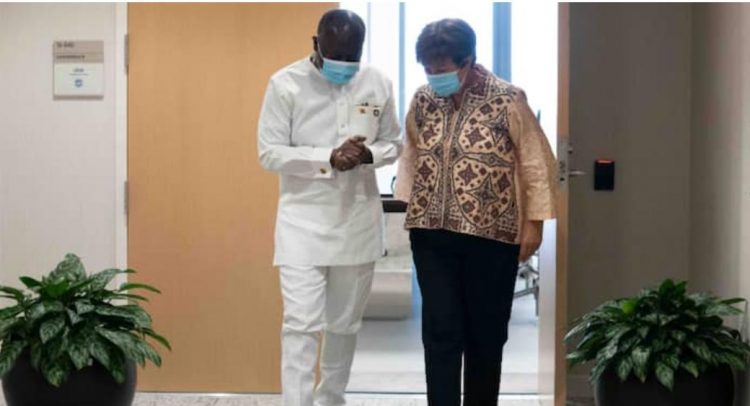Government has held another constructive engagement with the International Monetary Fund (IMF) on the bailout.
Minister of Finance, Ken Ofori-Atta led a delegation from Ghana to the meering which was held outside Ghana with the Managing Director of the Fund, Kristalina Georgieva and her team.
The meeting which appears successful was centered on Ghana’s economic challenges and the way forward.
IMF has reiterated it readiness to help Ghana stabilize the economy and lay ground for stronger growth and help most the vulnerable.
Confirming the engagement, the Managing Director of the Fund said in a Tweet that “Constructive meeting with the Ghana Finance Minister and his team on Ghana’s economic challenges and the way forward.
“We are ready to do our part to help the authorities stabilize the economy, lay the ground for stronger growth and help most the vulnerable.”
Ghana had previously refused to seek IMF support.
But on July 1, 2022, the President of the Republic, Nana Addo Dankwa Akufo-Addo, gave a directive to the Ministry of Finance, to commence an engagement with the International Monetary Fund (IMF) to support Ghana’s economic program.
This decision was taken amidst economic crisis which the country is going through.
A major reason for seeking IMF bailout is said to be the effects of COVID-19 and the Russian-Ukraine war.
A delegation from the IMF, on Wednesday July 13, 2022, concluded a one-week working visit to Accra and begun initial discussions with the Ghanaian authorities about a possible $3 billion bail-out loan.
During the visit, the IMF delegation held high level meetings with stakeholders and discussed possible support for Ghana’s domestic economic recovery programme.
After the engagement, the Fund released a press statement on July 13, 2022, which among other things states:
“Ghana is facing a challenging economic and social situation amid an increasingly difficult global environment. The fiscal and debt situation has severely worsened following the Covid-19 pandemic. At the same time, investors’ concerns have triggered credit rating downgrades, capital outflows, loss of external market access, and rising domestic borrowing costs.
“In addition, the global economic shock caused by the war in Ukraine is hitting Ghana at a time when the country is still recovering from the Covid-19 pandemic shock and with limited room for manoeuver.
“These adverse developments have contributed to slowing economic growth, accumulation of unpaid bills, a large exchange rate depreciation, and a surge in inflation.
“The IMF team held initial discussions…focused on improving fiscal balances in a sustainable way while protecting the vulnerable and poor; ensuring credibility of the monetary policy and exchange rate regimes; preserving financial sector stability; and designing reforms to enhance growth, create jobs, and strengthen governance.”
Government has promised to work closely with the IMF in the coming weeks to complete its enhanced economic programme, in support of a robust economic recovery.
In the meantime, Government reiterates its commitment to the various fiscal policy measures, geared towards mitigating the impact of current global economic headwinds on the economy and Ghanaians.
The Ministry of Finance further assures Ghanaians of the Government’s steadfast commitment to a speedy economic recovery, towards achieving a Ghana Beyond Aid.

BY Vincent Kubi


